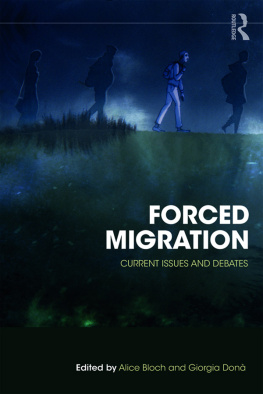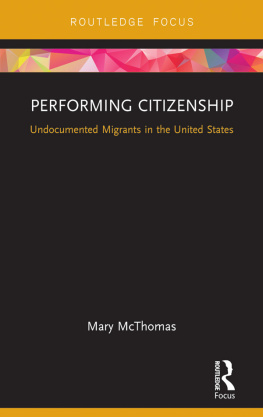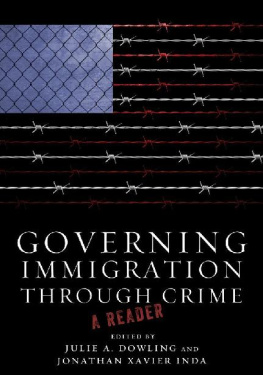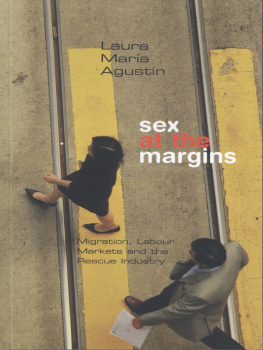LIVING ON THE MARGINS
Undocumented migrants
in a global city
Alice Bloch and Sonia McKay
First published in Great Britain in 2016 by
Policy Press University of Bristol 1-9 Old Park Hill Bristol BS2 8BB UK Tel +44 (0)117 954 5940 e-mail
North American office: Policy Press c/o The University of Chicago Press 1427 East 60th Street Chicago, IL 60637, USA t: +1 773 702 7700 f: +1 773-702-9756
Policy Press 2016
British Library Cataloguing in Publication Data
A catalogue record for this book is available from the British Library
Library of Congress Cataloging-in-Publication Data
A catalog record for this book has been requested
ISBN 978-1-4473-1936-8 hardcover
ISBN 978-1-4473-1940-5 ePub
ISBN 978-1-4473-1941-2 Mobi
The right of Alice Bloch and Sonia McKay to be identified as authors of this work has been asserted by them in accordance with the Copyright, Designs and Patents Act 1988.
All rights reserved: no part of this publication may be reproduced, stored in a retrieval system, or transmitted in any form or by any means, electronic, mechanical, photocopying, recording, or otherwise without the prior permission of Policy Press.
The statements and opinions contained within this publication are solely those of the author and not of the University of Bristol or Policy Press. The University of Bristol and Policy Press disclaim responsibility for any injury to persons or property resulting from any material published in this publication.
Policy Press works to counter discrimination on grounds of gender, race, disability, age and sexuality.
Cover design by Hayes Design
Readers Guide
This book has been optimised for PDA.
Tables may have been presented to accommodate this devices limitations.
Image presentation is limited by this devices limitations.
Contents
List of tables
Acknowledgements
There are many people who have been involved in this project over the years and we would like to thank them. First, thank you to the Economic and Social Research Council (grant reference ES/1037490/2), who funded the research project on which this book is based. Thank you to the 55 undocumented migrants and the 24 migrant entrepreneurs who were willing to share their experiences and whose lives form the empirical basis of this book. Salwa Chowdhury, Ozlem Galip, Tom Lam and Ansar Ahmed Ullah carried out the field work interviews with undocumented migrants and translated and transcribed the interviews. Their hard work, skills and knowledge helped to shape the project and we are grateful for their insights and input. Thank you to Jawad Botmeh, who worked with us during the first year of the project. We also had a great deal of support from others who enabled the relatively smooth running of the project within our institutions, notably Linda Butcher, Andrea Tinson and Gillian Whitworth and we would like to thank them for their help. We also received invaluable advice from members of our Project Advisory Group and some even acted as gatekeepers, facilitating access to interviewees and providing interview space. Finally, thank you to John Broadbent, who literally walked the streets of east London talking to people and cold calling in businesses to help us to find interviewees.
Alice would like to thank the following colleagues who have helped in one way or another even if they dont know it. Claire Alexander, Suki Ali, Leah Bassel, Wendy Bottero, Bridget Byrne, Kirsten Campbell, Milena Chimienti, Allan Cochrane, Giorgia Dona, Brian Heaphy, Shirin Hirsch, Vanessa May, Kate Nash, Sarah Neal, James Rhodes, Liza Schuster, John Solomos, Fran Tonkiss, Amal Treacher, Judy Wajcman and Frank Webster. Finally, thank you to Sonia McKay, who has not only been a fantastic colleague, over the years we have worked together, but a great friend too.
Sonia would like to similarly record her thanks to colleagues at the Working Lives Research Institute, Anna Paraskevopoulou, Nick Clark, Eugenia Markova, Cilla Ross, Leroi Henry; to Sian Moore and Tessa Wright for the insights they have provided in previous projects; to Rosa Crawford, Don Flynn and to the too numerous friends, colleagues and activists who fight to make sure that migrants get a fairer deal and are not the scapegoats for governmental failures. Sonia too needs to end this small piece by thanking Alice, not only a great colleague and supportive friend, but someone who can always be relied on to get a job done. This book itself is a tribute to that determination.
Both Alice and Sonia reserve a special thanks to Leena Kumarappan, who worked as a Research Fellow for the duration of the project and who was a vital member of the research team. Not only did we have the privilege of working with Leena but we had the joy of welcoming Leena and Murads wonderful daughter, Anisa.
ONE
Introduction
I had a passport prepared by the snakeheads We followed the snakeheads like fools. We didnt speak any English and didnt know where we were, how far we had travelled and so on. We were smuggling ourselves out of China I have been here for over 12 years I didnt do anything bad. People like us go about our business with a sense of honesty. We are hard working people. Each day wed be happy as long as weve done our job if you let people like us work like all the others, we can just pay tax contributions. Its our duty to pay tax contributions. All you need to do is give us the rights to work We dont have any excessive wants. But the current situation doesnt give us much freedom; and the authorities crack down hard on illegal workers. They are rounding up illegal workers Our plight is the worst of all. Wed be locked up if we were caught. We are the unluckiest of all. (Lok, male, from China)
Lok is 46 years old and comes from Fujian Province in China where he had worked on a building site doing repairs. He entered the United Kingdom (UK) on a fake passport with a fictitious name. He moved for livelihood reasons after his divorce, leaving his children in China. Since he has been in the UK his contact with family and friends has gradually reduced to almost nothing except for the money he still sends to his parents. In the UK his social networks are small and consist of others from the same province in China, mostly due to language barriers. His friends offer important support, in the absence of any statutory welfare provision, and during periods of ill health and therefore no income he has been able to stay with them rent free. Lok has worked only in the kitchens of Chinese restaurants and take-away shops while in the UK, starting as a kitchen porter doing the most menial labouring jobs and gradually working his way up to a chef. He works long hours and has little time off, describing his daily routine as one of work and sleep. Loks experiences are not dissimilar to those of other undocumented migrants in the UK and elsewhere. Life is work within ethnic enclaves or for co-ethnic employers, narrow but necessary co-ethnic social networks, and being forced into the periphery of society by the restrictions of status and the fear of being caught, incarcerated and deported.
This book is about the everyday lives of undocumented migrants in London, a group that by the very nature of their immigration status finds itself for the most part living on the margins of a global city. Our aim is to present the realities faced by undocumented migrants in London, who live under the constant shadow of insecurity and the fear of being caught and deported. The experiences we present are not unique to undocumented migrants in London, but are mirrored among undocumented migrants all over the world who are living and working in cities, on farms, in towns and in villages. Undocumented migration and undocumented migrants are a global phenomenon and almost universally they lack rights, are marginalised and excluded, and their labour is exploited.







